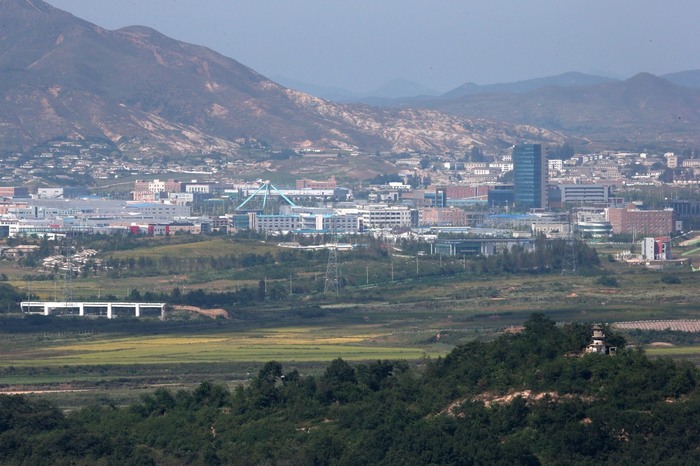 |
|
A view of the Kaesong Industrial Complex (Hankyoreh archives)
|
KBIZ survey finds SMEs see West Sea Economic Belt as ideal region for economic cooperation
Six out of ten cooperatives with small business members would be willing to participate in inter-Korean economic cooperation efforts, a survey shows. The Korea Federation of SMEs (KBIZ) announced findings on Oct. 4 from a survey of small business cooperative perceptions on inter-Korean economic cooperation conducted on Sept. 13–15 with 214 regional and industry cooperatives and associations nationwide. When asked about their attitudes on participation in inter-Korean economic cooperation, a far larger proportion described it as “necessary” (56.5%) than as “not very necessary” (37.4%). The percentage perceiving inter-Korean economic cooperation as necessary was also found to be higher for cooperatives with larger numbers of member companies and higher average sales. Respondents selected locations in North Korea’s “West Sea Economic Belt” as their desired areas for inter-Korean economic cooperation, including Kaesong (48.1%), Pyongyang (27.6%), and Haeju/Nampo (8.4%). Small businesses also indicated that the North Korean workforce remains a major draw in terms of helping establish competitiveness in toll processing manufacturing and trade, with a large number naming “use of North Korean workers similar to those in the Kaesong Industrial Complex” (39.3%) and “cooperation on consignment processing trade using North Korean workers” (28%) as their preferred methods of cooperation. When asked in which areas inter-Korean economic cooperation was most needed and feasible, respondents named manufacturing most frequently (29.2%), followed by construction (20.7%), farming/fishing/forestry (12.2%), and mining (10.7%). In terms of risks associated with cooperation, around seven out of cooperatives (67.8%) named the “unstable political situation,” as seen with the past closure of the Kaesong Complex and suspension of tourism at Mt. Kumgang. As the most important means of resolving the risks, the most frequently cited response was “restoring mutual trust through continued exchange” (18.7%). A large number of respondents – 57.9% – also said a separate private organization was needed to support small businesses taking part in inter-Korean economic cooperation. “Small businesses are quite committed to taking part in inter-Korean economic cooperation, but the burden of the political risk remains,” said Kim Gyeong-man, head of KBIZ’s trade and industry headquarters. “We hope to see the follow-up measures to the third inter-Korean summit being implemented without issues so that mutual trust is restored through continued exchange,” Kim added. Meanwhile, KBIZ plans to hold a roundtable on Oct. 10 at its offices in Seoul’s Yeouido neighborhood to share information about the outcome of the third inter-Korean summit and issues in inter-Korean relations and deliberate over response measures at the small business community level. By Park Soon-bin, senior staff writer Please direct comments or questions to [english@hani.co.kr]






